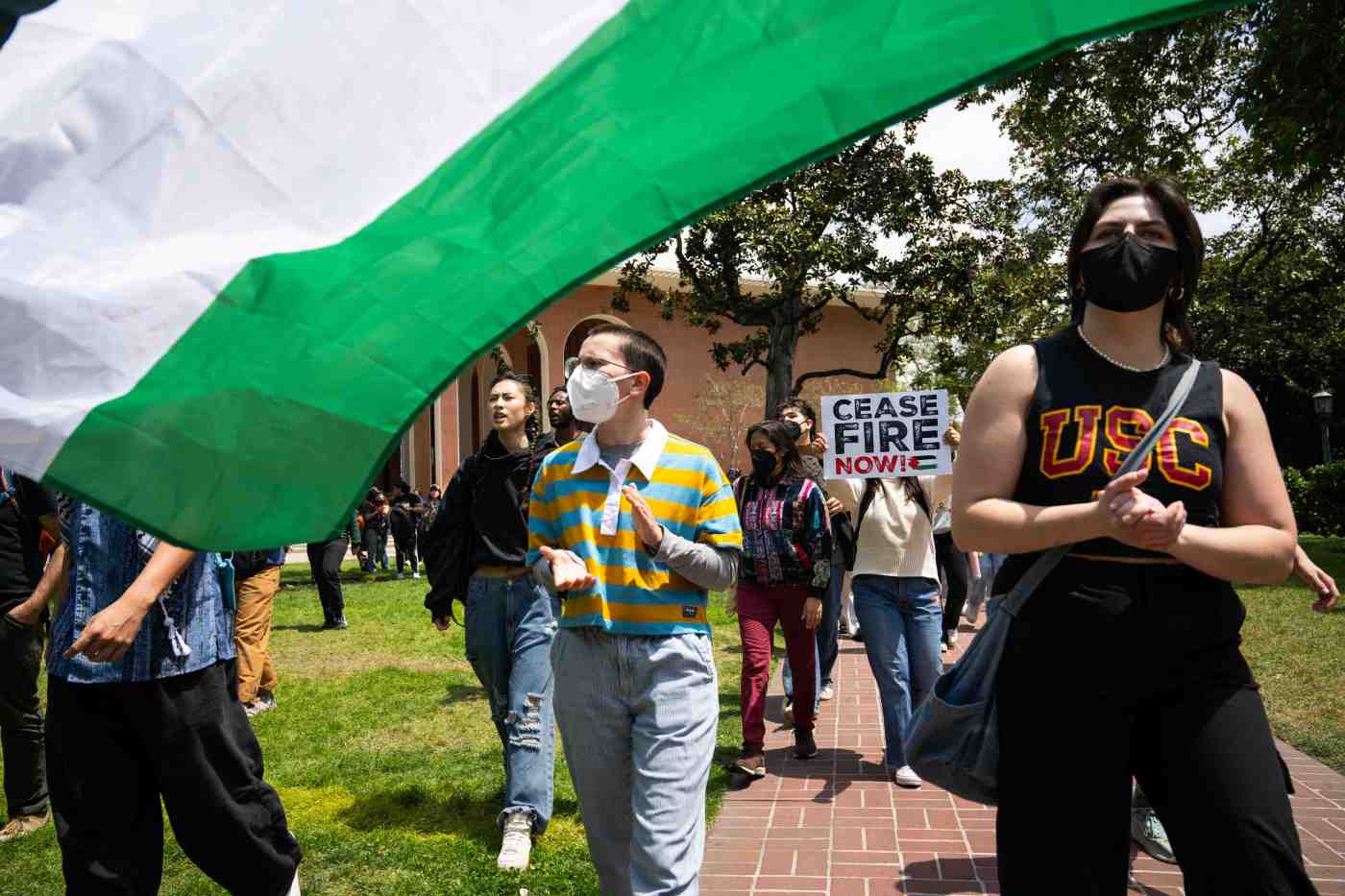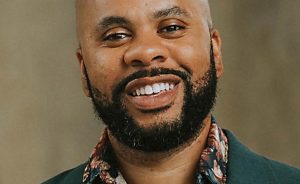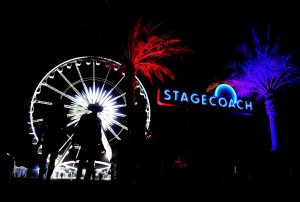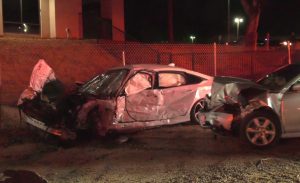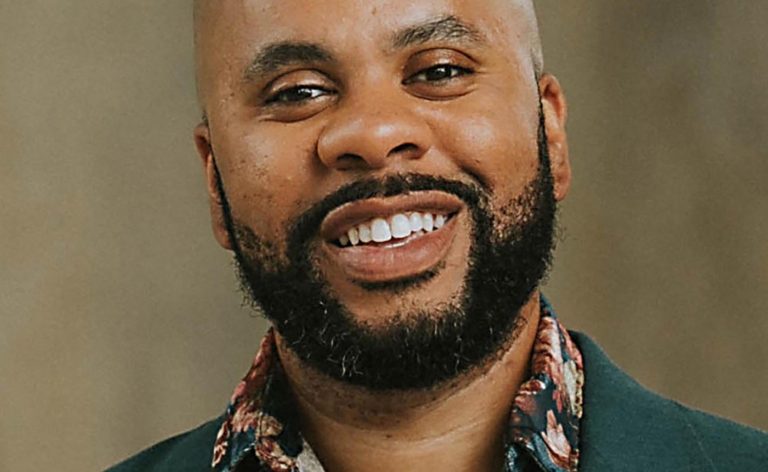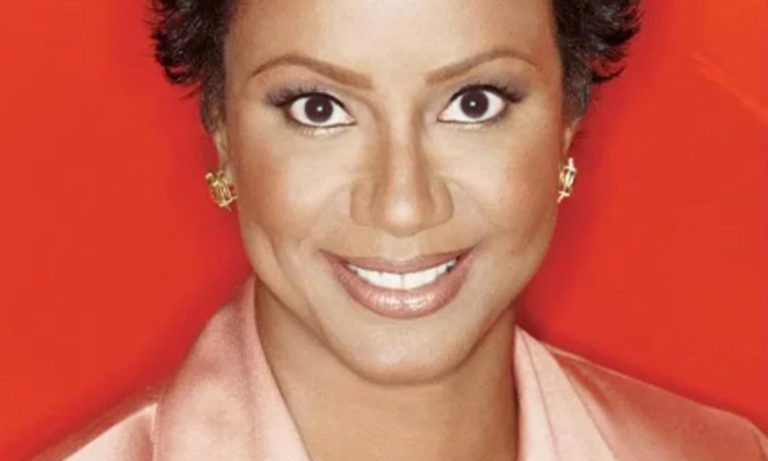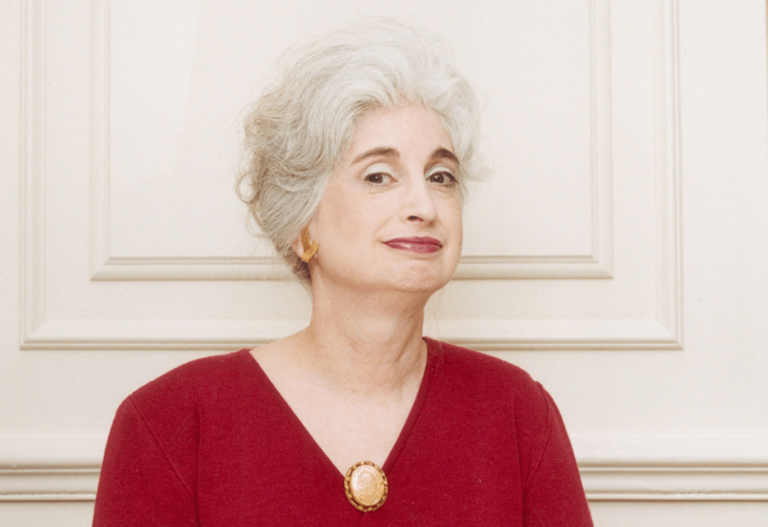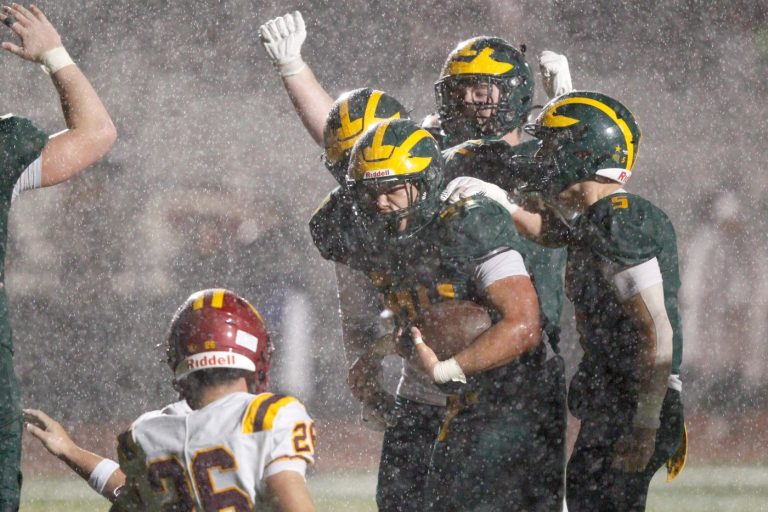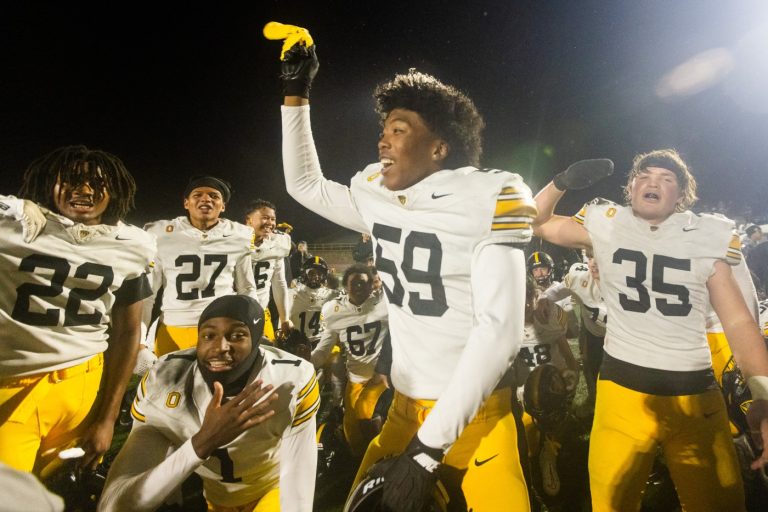As tensions boil at universities across the country amid scattered police confrontations with pro-Palestinian protesters, Southern California colleges are grappling with campus safety issues as graduation ceremonies near in the coming weeks.
Locally, major disruptions have occurred at four campuses — USC, UCLA, UC Irvine and Pomona College — over student-led demands for a permanent ceasefire in the war on Gaza and an end to financial support for Israel. And although security concerns there have been the most intense, other Southern California colleges are now taking measures to ensure their commencement activities — and the weeks leading up to them — are free of similar clashes.
Turmoil has been highest at USC, which found itself in a national spotlight when it canceled the commencement speech by Muslim valedictorian Asna Tabassum of Chino Hills over security concerns triggered by her anti-Israel social media views. A backlash over that decision from students and outside groups prompted the university to cancel all graduation speakers and honorees at its main commencement ceremony.
Then, days later as tensions flared, the LAPD arrested nearly 100 pro-Palestinian protesters at USC. University officials responded by canceling its “main stage” commencement scheduled May 10 over “new safety measures.” The ceremony was expected to draw 65,000 people to Alumni Park.
The school, however, still will host “dozens” of smaller, secure commencement events and receptions from May 8 to 11 where graduates can walk across the stage to receive their diplomas. The secured events will be ticketed, with a “clear bag” policy.
‘Massive overreaction’
Some have condemned USC for what they believe was an escalating series of missteps that provoked much of the hostility on campus.
Mike Ananny, a tenured USC professor who was among 50 faculty members protesting on campus Friday, April 26, blamed the university for “a massive overreaction” to the threats that surfaced over Tabassum’s speech. USC, he said, could have resorted to other options over stripping the valedictorian of her voice.
“I find ‘safety concerns’ hard to believe because the university has hosted many other contentious speakers and has invested security resources, so they chose not to do that,” said Ananny, 48. “I think (students’) voice is very much needed at this time. The big error and failure was inviting the LAPD in riot gear with nonlethal weapons, intimidating students and faculty and, really, the LAPD turned the campus into a zone of military activity.”
Must ‘protect our community’
However, USC President Carol Folt defended the university’s actions.
In a community email sent late Friday, Folt reiterated her responsibility as president to “uphold our Trojan values so that everyone who lives, learns, and works here can have safe places to live, learn, and speak.” She also called Alumni Park, the center of protests and the traditional site of commencement, “unsafe,” claiming that buildings were vandalized, among other safety issues.
“No one wants to have people arrested on their campus. Ever,” Folt said. “But, when long-standing safety policies are flagrantly violated, buildings vandalized, DPS directives repeatedly ignored, threatening language shouted, people assaulted, and access to critical academic buildings blocked, we must act immediately to protect our community.”
USC graduate student Morgan Dommu said the university hasn’t gotten the message from protesters.
“It’s clear whose interests this school has at heart,” Dommu said. “We want to learn, just not at the expense of someone else’s life.”
No ‘right to intimidate’
Meanwhile, organizers from the student-led USC Hillel issued a statement on Instagram last week saying that while students have a right to protest, “they do not have the right to intimidate or threaten Jewish students.”
“No student should feel unwelcome in their own campus home, and our Jewish students are telling us that these actions and this hostile rhetoric induce feelings of fear, terror, and instability,” the statement read. It further called on USC partners to ensure a safe campus.
Calling the commencement cancelation a “heavy blow” and noting that students in the Class of 2024 also were deprived of their high school graduation ceremonies because of the pandemic, the group decided to organize its own Jewish Communal Commencement at the Hillel on May 10.
Other campus protests
Across town at the Westwood campus of UCLA, a “Palestine solidarity” encampment that started Thursday with students outside Royce Hall grew to include more than 1,000 activists. They demanded that the UC system sever its connection to Israeli universities, support an immediate ceasefire in Gaza and end “the occupation and genocide in Palestine.” No arrests have been made.
Mary Osako, vice chancellor for UCLA’s strategic communications, said the university is trying to uphold its “history of peaceful protest” as it works to strike a balance between safety and First Amendment rights of free speech.
“It’s also important to note that we are following University of California systemwide policy guidance, which directs us not to request law enforcement involvement preemptively, and only if absolutely necessary to protect the physical safety of our campus community,” Osako said.
UCLA, which does not have valedictorians or a “main” graduation ceremony like at USC, is planning for multiple college ceremonies on Friday, June 14. Officials did not respond to questions about security related to the events.
At UC Irvine, where a large pro-Palestinian demonstration was held on campus Thursday, this year’s graduation will be “business as usual,” spokesperson Tom Vasich said.
“A very different story” from USC, Vasich said.
While security protocols were in place at the campus-wide demonstration, Vasich said the university did not want to escalate the situation, saying they “want to protect (the protesters’) First Amendment rights.”
The school, which also does not have valedictorians, will host various commencement ceremonies from early May through mid-June.
Abri Magdaleno, a graduating English major at UCI, acknowledged students are concerned “that things are going to be impacted, such as commencement, because of how intense this is.”
“UCI has always been business as usual for pretty much everything — except for COVID, of course,” Magdaleno said. “Ultimately, I don’t think commencement will be affected. We’ll have to see what the administration does.”
Other colleges carry on
Related Articles
An obscure California law may prevent action on protesters’ calls for divestment from Israel
History lesson: Are student protests the best and most efficient way to spark social change?
Pro-Palestinian students have peacefully evacuated prestigious Paris university campus building
Cal Poly Humboldt closes campus for rest of semester over Gaza protests
Letters: Recall a waste | Eliminating plastics | Student protesters | Fund diplomacy
Officials at Chapman University in Orange said the ongoing Israel-Hamas conflict has not affected any plans for graduation, with ceremonies scheduled from May 17 through 19. On Wednesday, the university’s Students for Justice in Palestine held a small protest on campus, but the event did not interrupt campus operations and there were no complaints from public safety personnel, said Chapman spokesperson Molly Thrasher.
Thrasher said the university is in the midst of commencement planning, and will continue to monitor political activities on campus.
At Cal State Northridge, commencement ceremonies will go on as scheduled from May 17 through May 20. The school’s website includes messaging on how it will handle security through the Department of Police Services, including metal detector screenings and a one-bag policy. Spokesperson Perrine Mann declined to comment about whether the potential for protests has affected their graduation plans.
Cal State Los Angeles also has “no plans to alter our traditional commencement” on May 20 and 21 at the Los Angeles Convention Center, said Victor M. Rojas Jr., the college’s chief of staff. Rojas added that all campus events have proper protocols to “ensure a safe and celebratory environment for all participants and attendees.”
Cal State LA students are planning a pro-Palestine protest on May Day, May 1.
“The university values freedom of expression as a cornerstone of a democratic society and believes it is essential to the educational process,” Rojas said.
Cal State Long Beach, the site of protests and vigils in the aftermath of the Oct. 7 attacks in Israel, has not had any form of physical attacks or violence, according to spokesperson Jeff Cook.
“We’ve remained concerned for any member of our community who feels impacted by perceived antisemitism or Islamophobia, and have in place procedures to both provide support and the substantive review of any concerns, if made,” Cook said in an email.
Cook also said safety during commencement — planned for May 19 through 23 at Angel Stadium — is “always central to our planning.”
At Cal Poly Pomona, spokesperson Cynthia Peters said university leadership, police and graduation organizers have been working together on plans “to ensure the safety of all commencement ceremonies,” which are planned for May 17 through 20 in the school quad.
Peters said there has been no major political disruption on campus, and that Cal Poly’s Dean of Students Office has “been in continuing dialog with the student groups most impacted by conflict in Gaza and Israel to listen and to learn how the university can best support them.”
At Cal State San Bernardino, commencement ceremonies are planned for May 17 and 18 at Toyota Arena in Ontario. Spokesperson Alan Llavore said university and city police will be present to ensure “that commencement can take place with little to no disruptions.”
UC Riverside also will conduct most of its eight graduations — scheduled from late May through mid-June — at Toyota Area. Spokesperson Sandra Martinez said university and city police will focus on “pursuing the highest level of safety for the community and guests.”
Martinez said that UCR has not had any significant protest activity on campus lately related to the Gaza conflict.
Nationwide reckoning
Some believe that unrest on college campuses is merely a reflection of a nationwide reckoning.
At a news conference in Beverly Hills late last week, Republican U.S. Senate candidate Steve Garvey called campus turmoil — from Columbia and Ohio State to the University of Texas and NYU — a “moment where terrorism is disguised as free speech.”
“I believe demonstrations that allow people to build encampments that obstruct the pathway to classes and the opportunity to learn is terrorism,” Garvey said. “I believe there is free speech but I also believe that demonstrations that disrupt the business and natural flow of colleges and universities to teach our young children about the future, and how to be future leaders, are interrupted by terrorists.”
Brian Levin, a professor emeritus at Cal State San Bernardino and founder of the Center for the Study of Hate and Extremism, noted the rising number of hate crimes and rhetoric among both anti-Jewish and anti-Muslim groups in major cities since the Hamas attacks on Oct. 7.
Levin argued that college campuses are meant to foster open, nuanced communication — and students oftentimes have the loudest voice when it comes to causes. He said administrators must be sensitive about the “generational grief” that students, particularly those of color, are experiencing, and do their best to avoid a “militarized response when free speech has a technical violation of rules.”
“Taking passionate moral positions on the issues of the day is not only the right of students, but to peaceably do so is an obligation,” Levin said. “Universities have an obligation at large to engage in this conversation. … They are supposed to be that shining place, (where) free expression is the default.”
Staff writers Kaitlyn Schallhorn, Clara Harter and Hanna Kang contributed to this report.
